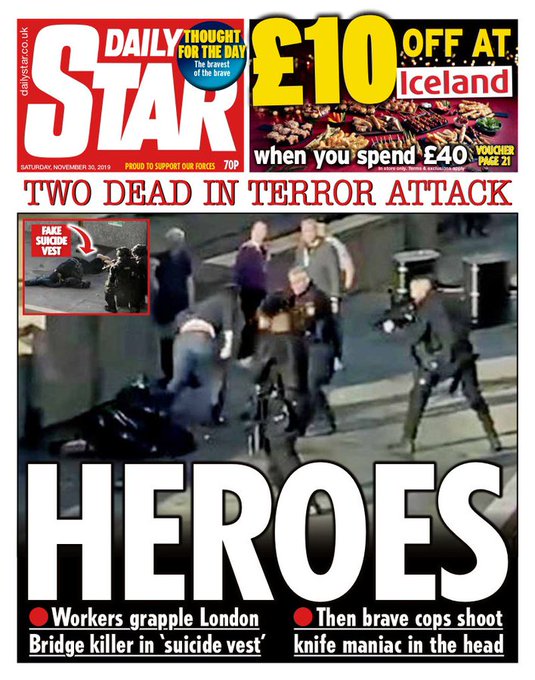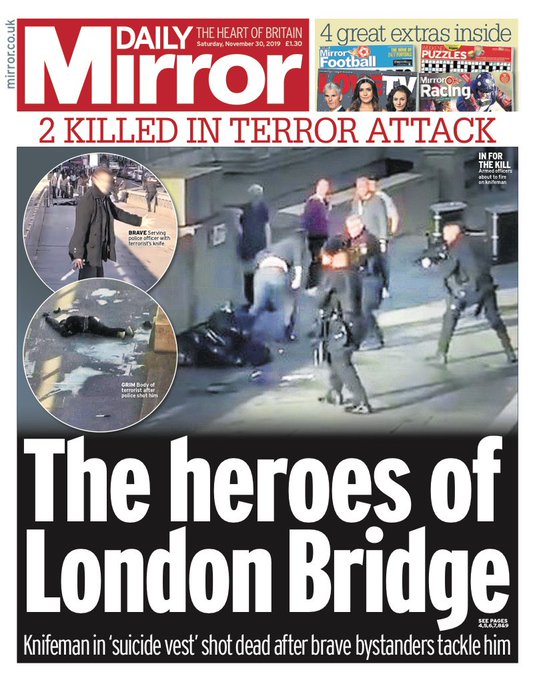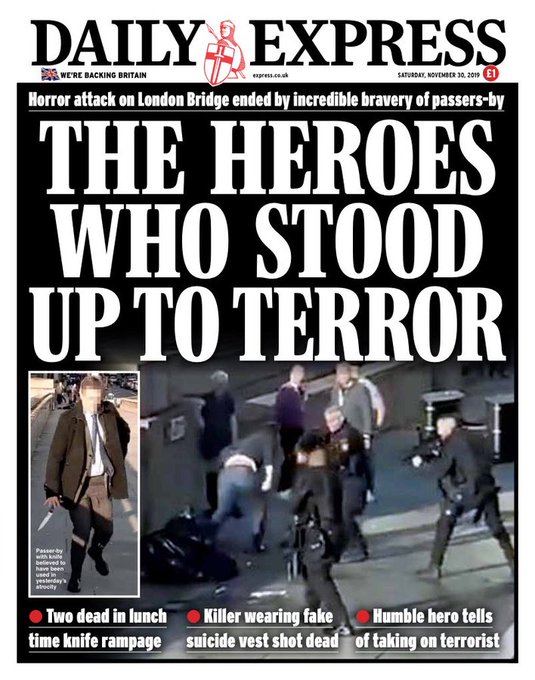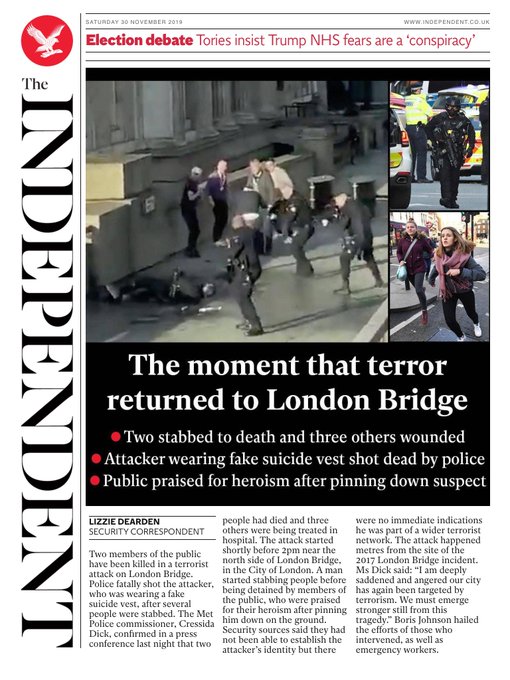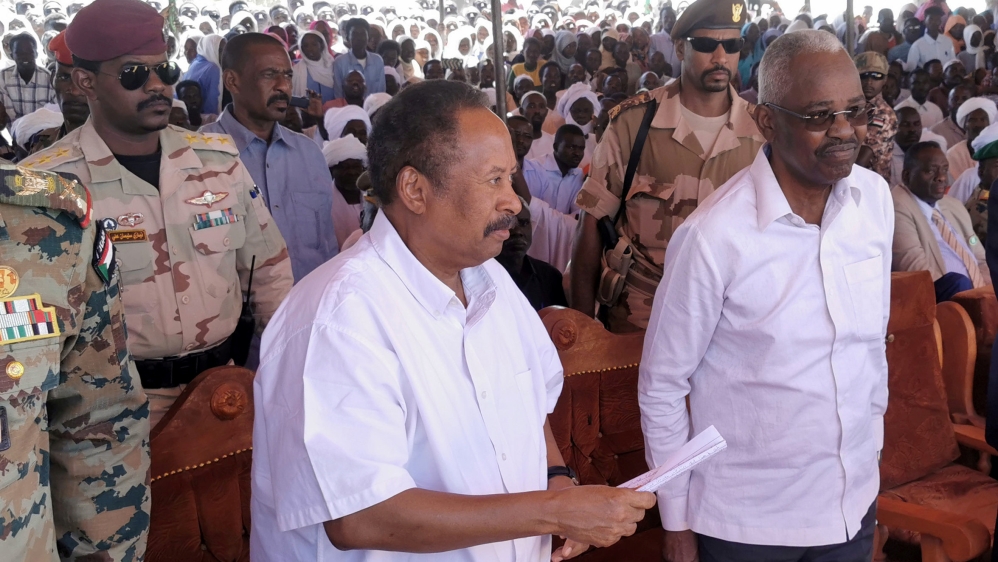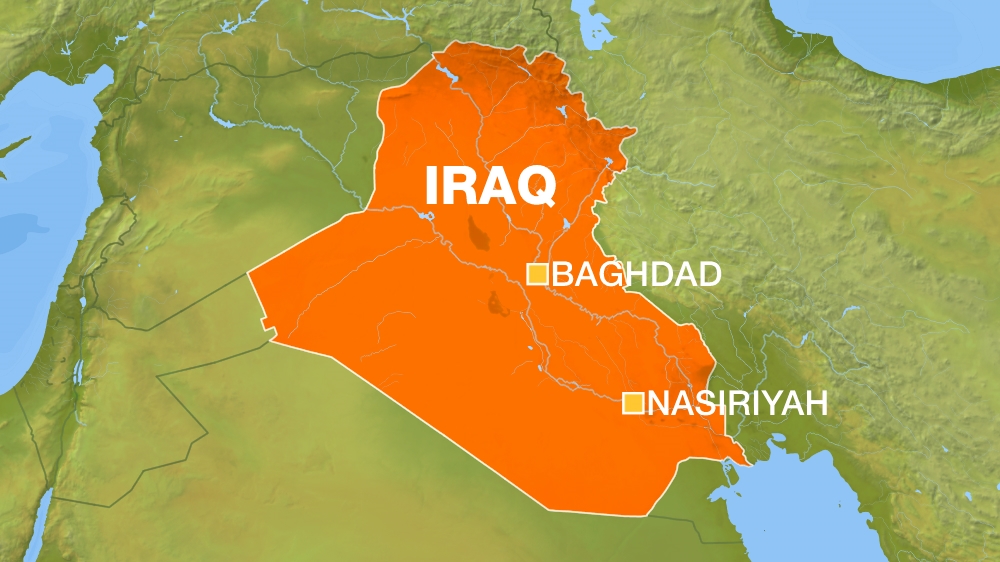Month: November 2019
London Bridge attacker named as Usman Khan, 28 – as it happened
Man was part of 2010 plot to attack the Stock Exchange which was disrupted by MI5 and the police
What we know about the London Bridge attacker
Updated
What we know so far
London Bridge attacker Usman Khan was jailed for terrorism offences in 2012, the Met said.
He was part of the Stock Exchange plot which was disrupted by MI5 and the police.
He is also understood to have been a supporter of al-Muhijaroun, the extremist group which scores of terrorists were involved with, according to the anti-extremism group Hope Not Hate.
Ex-CIA Officer Sentenced To 19 Years For Conspiracy To Spy For China |NPR

Source: Photo by Matthew Ansley on Unsplash
Former CIA officer, Jerry Chun Shing Lee, has been sentenced to almost two decades in prison after conspiring to hand over sensitive information to China. Reports say there is no proof that Lee was successful in his operations before his arrest. He had received over $840,000 from Chinese intelligence officers, had interactions with foreign officials, and attempted to acquire national defense documents. “Lee sold out his country, conspired to become a spy for a foreign government, and then repeatedly lied to investigators about his conduct,” commented U.S. Attorney for the Eastern District of Virginia G. Zachary Terwilliger.
sofx.com
Sudan approves new law ‘dismantling’ Omar al-Bashir’s regime
![Sudan approves new law 'dismantling' Omar al-Bashir's regime Al-Bashir is being held in a prison in Khartoum [FIle: Mohamed Nureldin Abdallah/Reuters]](https://www.aljazeera.com/mritems/imagecache/mbdxxlarge/mritems/Images/2019/11/29/23f244c0ee5442de909d49df96f1eddf_18.jpg)
Sudan‘s transitional authorities approved a law late on Thursday to “dismantle” the regime of former President Omar al-Bashir, including the dissolution of his political party and confiscation of all its properties – in response to a key demand of protesters that helped overthrow his government in April.
The law was passed during a joint meeting of Sudan’s sovereign council and cabinet that lasted several hours, during which the body also scrapped a law regulating women’s dress and behaviour.
More:
The Sudanese Professionals Association (SPA), which spearheaded the protests against al-Bashir, welcomed the law, saying it was “an important step on the path to building a democratic civilian state.”
Prime Minister Abdalla Hamdok said on Twitter that the law was not an act of revenge, but was rather aimed at preserving the “dignity of the Sudanese people”.
“We passed this law in a joint meeting to establish justice and respect the dignity of the people, and safeguard their gains, and so that the people’s looted wealth can be recovered,” he added.
‘Significant reform’
Al Jazeera’s Hiba Morgan, reporting from Khartoum, said the new decree “embodies the demands of the Sudanese people”.
According to the new law, members of al-Bashir’s old party are barred from seeking an elective position in the next 10 years.
“This is significant, and to a certain degree it fulfils the demands of the people, who have been protesting for the past few months, demanding a change in governance,” our correspondent said.
Hamdok’s government was formed in September after a power-sharing deal between anti-al-Bashir groups and the Transitional Military Council that ruled the country immediately after Bashir’s overthrow.
|
|
Implementation of the law will be a crucial test of how far transitional authorities are willing or able to go to overturn nearly three 30 years of rule by al-Bashir, who took power in a 1989 coup.
Meanwhile, Justice Minister Nasredeen Abdulbari said the government has repealed a law used under al-Bashir to regulate women’s dress and behaviour and punish those found to contravene it with flogging.
The law was deployed to impose conservative Islamic social codes, restricting women’s freedom of dress, movement, association, work and study. It had been widely criticised by local and international human rights groups.
Al-Bashir and his National Congress Party (NCP) had ruled the northeast African country since June 30, 1989, before a nationwide protest movement resulted in him being deposed him earlier this year.
Protests erupted against al-Bashir’s government in December 2018 and quickly turned into a nationwide anti-regime movement that finally led to his removal.
The army deposed him on April 11 in a palace coup, and in August a joint civilian and military sovereign council was formed to oversee the country’s transition to civilian rule as demanded by protesters.
A civilian-led cabinet headed by Hamdok is charged with the day-to-day running of the country.
Al-Bashir is being held in a prison in Khartoum facing trial on charges of corruption. Several other officials of his government and senior party members are also in jail.
SOURCE: AL JAZEERA AND NEWS AGENCIES
‘Bloodbath’: Dozens of protesters killed as army deploys south
Baghdad, Iraq – Iraqi security forces on Thursday shot dead at least 44 people in the country’s south in one of the bloodiest days of violence since the anti-government protests erupted in early October.
At least 33 protesters were reported killed in Nasiriya city after security forces used live ammunition and tear gas canisters on crowds while another 11 people were killed in Shia holy city of Najaf, where an Iranian consulate was torched a day earlier by angry protesters.
Security sources told Al Jazeera at least 233 people were wounded in the crackdown on protests in Nasiriya.
More:
-
Iraq condemns attack on Iranian consulate in Najaf
-
Baghdad’s commercial hub feels pinch as Iraq protests continue
-
Reports: Leaked intelligence cables show Iran’s sway in Iraq
The Iraqi goverment fired Lieutenant-General Jamil al-Shammari, who was appointed a day earlier to manage the unrest in Dhi Qar province, of which Nasiriya is the capital, following the deadly violence.
Amid escalating protests in the country’s south, authorities in the capital, Baghdad, dispatched troops to “restore order” there, which has seen massive protests for weeks.
‘Force won’t scare us’
Hussein, a 32-year-old lawyer from Nasiriya who was at the protest site, blamed security forces for what he called a “bloodbath”.
“We had blocked off the roads and bridges over the past four days and security forces moved in on us to try to open up the bridges. They opened fire leading to a bloodbath,” he told Al Jazeera.
“What’s happening in Nasiriya is unbelievable. Nothing justifies this use of violence against us. We, the people, are extremely angry. Our blood is boiling. Our brothers were killed unjustifiably.
“But this use of force won’t scare us. More of us have gone out to the streets to either demand justice for those who have been killed or keep the bridges under our control.”
Khalifa, a 30-year-old protester, said most demonstrators in Nasiriya lost a brother or a friend during the bloody events on Thursday.
“The pain is deep and that only makes us more adamant to protest,” he said. “We will stay in the streets until our demands our met – no matter what level of force is used against us.”
The governor of Dhi Qar, Adel al-Dukhali, who had earlier blamed military commanders for the deadly violence, resigned in protest against the killings.
Al-Dukhali had called for an investigation into what he described as an “unacceptable” use of force against protesters.
|
|
Iran demands action
The events in Nasiriya come a day after anti-government protesters stormed and set fire to the Iranian consulate in Najaf, in the strongest expression of anti-Iranian sentiment by Iraqi protesters, who have taken to the streets in Baghdad and Iraq’s mainly Shia south since early October.
More than 360 people have been killed and about 15,000 wounded so far.
Iraqi authorities responded by condemning the attack and imposing a curfew in Najaf, while Iran demanded that Iraq take decisive action against “aggressors” behind the arson attack.
Iran’s foreign ministry spokesman Abbas Mousavi, quoted by state news agency IRNA, condemned the attack and “demanded decisive, effective and responsible action … against destructive agents and aggressors”.
Najaf attack
Wednesday’s Najaf attack was the second of its kind this month after protesters targeted the Iranian consulate in the Iraqi holy city of Karbala on November 4.
The protesters were holding a demonstration in central Najaf when a group started to close off the main roads and set the tyres of police cars on fire.
A witness told Al Jazeera “security forces responded using tear gas and sound bombs to disperse the protesters who ran towards the Iranian embassy”.
“The protesters were angered by the security forces trying to disperse the demonstration. They started burning tyres near the consulate and eventually set the consulate ablaze, minutes after the consulate staff evacuated the building,” said the source.
Commenting on the developments, Iraqi analyst Jasim Moussawi said protesters setting the consulate ablaze was an attempt to tarnish historical relations between Tehran and Baghdad.
“Those who are responsible for setting fire to the Iranian consulate in Najaf have the same message as those who did it in Karbala. Their message is a warning against the intervention of Iran in Iraq’s internal affairs,” said Moussawi.
The violence will push the government to allow security forces to use more force to quell protests, he said.
SOURCE: AL JAZEERA NEWS




